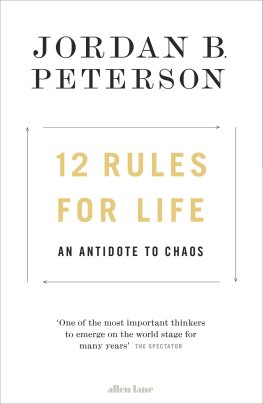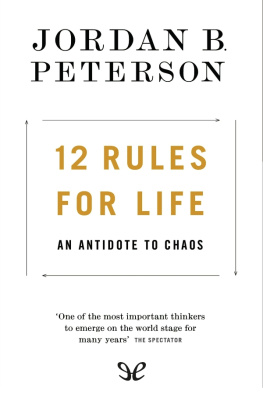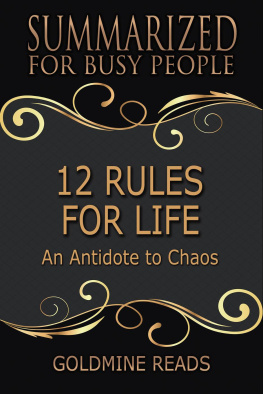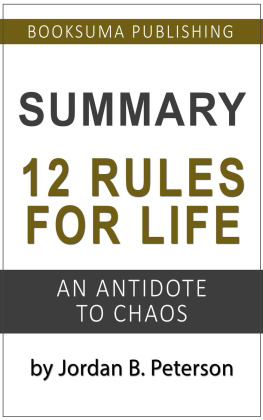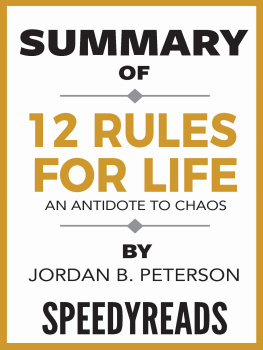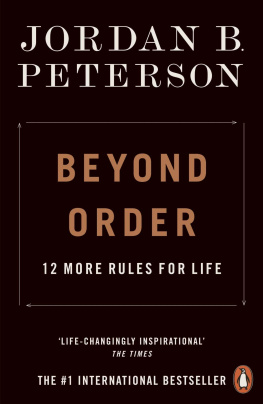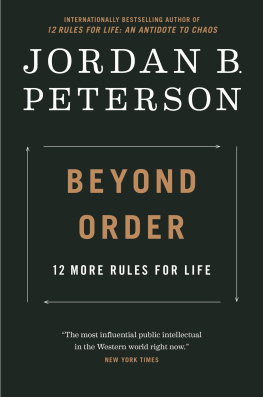Rules? More rules? Really? Isnt life complicated enough, restrictingenough, without abstract rules that dont take our unique, individualsituations into account? And given that our brains are plastic, and alldevelop differently based on our life experiences, why even expect thata few rules might be helpful to us all?
People dont clamour for rules, even in the Bible as when Moses comesdown the mountain, after a long absence, bearing the tablets inscribedwith ten commandments, and finds the Children of Israel in revelry.Theyd been Pharaohs slaves and subject to his tyrannical regulationsfor four hundred years, and after that Moses subjected them to the harshdesert wilderness for another forty years, to purify them of theirslavishness. Now, free at last, they are unbridled, and have lost allcontrol as they dance wildly around an idol, a golden calf, displayingall manner of corporeal corruption.
Ive got some good news and Ive got some bad news, the lawgiveryells to them. Which do you want first?
The good news! the hedonists reply.
I got Him from fifteen commandments down to ten!
Hallelujah! cries the unruly crowd. And the bad?
Adultery is still in.
So rules there will bebut, please, not too many. We areambivalent about rules, even when we know they are good for us. If weare spirited souls, if we have character, rules seem restrictive, anaffront to our sense of agency and our pride in working out our ownlives. Why should we be judged according to anothers rule?
And judged we are. After all, God didnt give Moses The TenSuggestions, he gave Commandments; and if Im a free agent, my firstreaction to a command might just be that nobody, not even God, tells mewhat to do, even if its good for me. But the story of the golden calfalso reminds us that without rules we quickly become slaves to ourpassionsand theres nothing freeing about that.
And the story suggests something more: unchaperoned, and left to our ownuntutored judgment, we are quick to aim low and worship qualities thatare beneath usin this case, an artificial animal that brings out ourown animal instincts in a completely unregulated way. The old Hebrewstory makes it clear how the ancients felt about our prospects forcivilized behaviour in the absence of rules that seek to elevate ourgaze and raise our standards.
One neat thing about the Bible story is that it doesnt simply list itsrules, as lawyers or legislators or administrators might; it embeds themin a dramatic tale that illustrates why we need them, thereby makingthem easier to understand. Similarly, in this book Professor Petersondoesnt just propose his twelve rules, he tells stories, too, bringingto bear his knowledge of many fields as he illustrates and explains whythe best rules do not ultimately restrict us but instead facilitate ourgoals and make for fuller, freer lives.
The first time I met Jordan Peterson was on September 12, 2004, at thehome of two mutual friends, TV producer Wodek Szemberg and medicalinternist Estera Bekier. It was Wodeks birthday party. Wodek and Esteraare Polish migrs who grew up within the Soviet empire, where it wasunderstood that many topics were off limits, and that casuallyquestioning certain social arrangements and philosophical ideas (not tomention the regime itself) could mean big trouble.
But now, host and hostess luxuriated in easygoing, honest talk, byhaving elegant parties devoted to the pleasure of saying what youreally thought and hearing others do the same, in an uninhibitedgive-and-take. Here, the rule was Speak your mind. If the conversationturned to politics, people of different political persuasions spoke toeach otherindeed, looked forward to itin a manner that is increasinglyrare. Sometimes Wodeks own opinions, or truths, exploded out of him, asdid his laugh. Then hed hug whoever had made him laugh or provoked himto speak his mind with greater intensity than even he might haveintended. This was the best part of the parties, and this frankness, andhis warm embraces, made it worth provoking him. Meanwhile, Esterasvoice lilted across the room on a very precise path towards its intendedlistener. Truth explosions didnt make the atmosphere any less easygoingfor the companythey made for more truth explosions!liberating us, andmore laughs, and making the whole evening more pleasant, because withde-repressing Eastern Europeans like the Szemberg-Bekiers, you alwaysknew with what and with whom you were dealing, and that frankness wasenlivening. Honor de Balzac, the novelist, once described the balls andparties in his native France, observing that what appeared to be asingle party was always really two. In the first hours, the gatheringwas suffused with bored people posing and posturing, and attendees whocame to meet perhaps one special person who would confirm them in theirbeauty and status. Then, only in the very late hours, after most of theguests had left, would the second party, the real party, begin. Here theconversation was shared by each person present, and open-heartedlaughter replaced the starchy airs. At Estera and Wodeks parties, thiskind of wee-hours-of-the-morning disclosure and intimacy often began assoon as we entered the room.
Wodek is a silver-haired, lion-maned hunter, always on the lookout forpotential public intellectuals, who knows how to spot people who canreally talk in front of a TV camera and who look authentic becausethey are (the camera picks up on that). He often invites such people tothese salons. That day Wodek brought a psychology professor, from my ownUniversity of Toronto, who fit the bill: intellect and emotion intandem. Wodek was the first to put Jordan Peterson in front of acamera, and thought of him as a teacher in search ofstudentsbecause he was always ready to explain. And it helped that heliked the camera and that the camera liked him back.
That afternoon there was a large table set outside in theSzemberg-Bekiers garden; around it was gathered the usual collection oflips and ears, and loquacious virtuosos. We seemed, however, to beplagued by a buzzing paparazzi of bees, and here was this new fellow atthe table, with an Albertan accent, in cowboy boots, who was ignoringthem, and kept on talking. He kept talking while the rest of us wereplaying musical chairs to keep away from the pests, yet also trying toremain at the table because this new addition to our gatherings was sointeresting.
He had this odd habit of speaking about the deepest questions to whoeverwas at this tablemost of them new acquaintancesas though he were justmaking small talk. Or, if he did do small talk, the interval betweenHow do you know Wodek and Estera? or I was a beekeeper once, so Imused to them and more serious topics would be nanoseconds.
One might hear such questions discussed at parties where professors andprofessionals gather, but usually the conversation would remain betweentwo specialists in the topic, off in a corner, or if shared with thewhole group it was often not without someone preening. But thisPeterson, though erudite, didnt come across as a pedant. He had theenthusiasm of a kid who had just learned something new and had to shareit. He seemed to be assuming, as a child wouldbefore learning howdulled adults can becomethat if he thought something was interesting,then so might others. There was something boyish in the cowboy, in hisbroaching of subjects as though we had all grown up together in the samesmall town, or family, and had all been thinking about the very sameproblems of human existence all along.
Peterson wasnt really an eccentric; he had sufficient conventionalchops, had been a Harvard professor, was a gentleman (as cowboys can be)though he did say damn and bloody a lot, in a rural 1950s sort ofway. But everyone listened, with fascination on their faces,because he was in fact addressing questions of concern toeveryone at the table.

